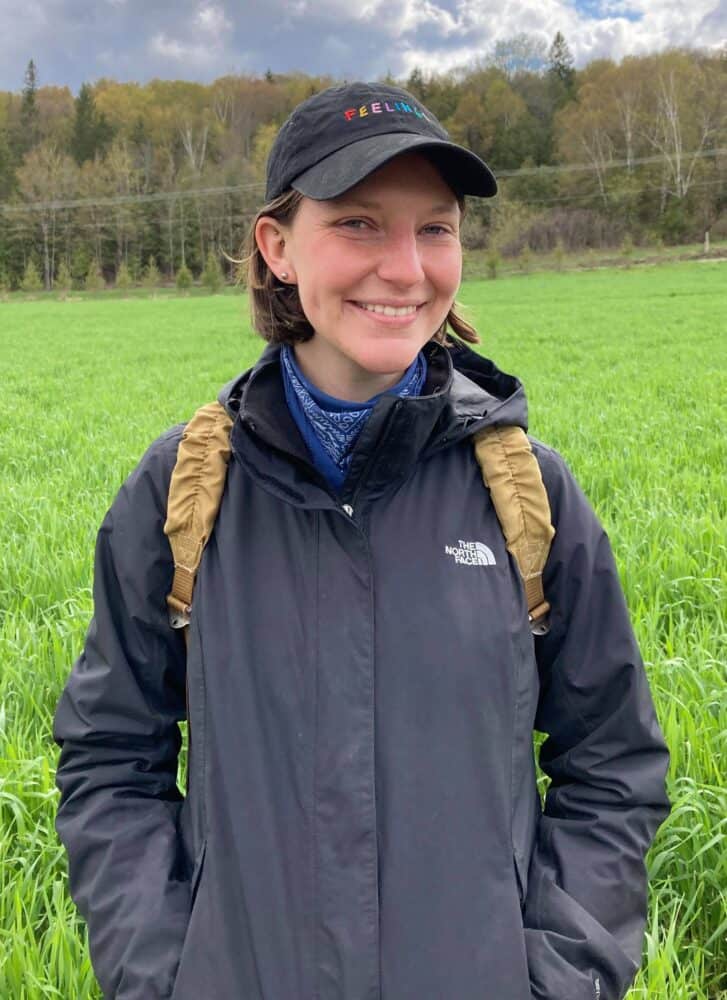Meara Kirwin (they/them) is a 25 year old new farmer and experienced organizer living in Amiskwacîwâskahikan (Edmonton). They’re honoured to receive this award and will be sharing the prize with the Wet’suwet’en Land Defenders Legal Fund.
Here is Meara’s winning entry:
A lot has happened this season while young farmers have had our heads down and hands in the soil. Every time we’ve had a moment to look up from our work, we’ve been confronted with a barrage of difficult political, social and ecological realities. One of the most urgent of these has been the now unavoidable truth of Indigenous genocide in Canada, and the recognition that we all have a part to play in righting these ongoing wrongs. As we settle into winter, and many farmers have more time to rest, reflect and plan, we might finally have the time to engage with what this reality means for us, as young farmers. Perhaps most directly, it means that we need to engage with the movement for Indigenous food sovereignty in Canada and abroad. As a young, new farmer, and a settler on these lands, I don’t pretend that I know the way forward. However, my years of community organizing have taught me that the first steps are simple – we need to build real relationships with each other, and plug into our collective power.
What is food sovereignty? The concept comes from Indigenous and landless peasant farmer movements, fighting against land dispossession and forceful integration into exploitative and unsustainable global food economies. Food sovereignty is a demand for community-governed food systems which connect land, producers and consumers in sustainable and meaningful relationships. It cannot be divorced from anti-colonial struggle, since sovereignty of food requires sovereignty of land, which in turn requires political sovereignty from other nations and their corporations. In the Canadian context, this means returning healthy, arable land, and the rights to decide how to use and take care of it, to Indigenous nations.
The injustice of the Seasonal Agricultural Worker Program (SAWP) in Canada is also fundamentally linked to colonial attacks on food sovereignty. As corporations from powerful countries such as Canada and the USA buy up land in the global south whether for mining, agriculture or other industries, Indigenous and peasant farmers lose their livelihoods, and consumers lose access to affordable, nourishing food. Under contexts of great precarity and food insecurity, many are forced to consider joining the dangerous SAWP program to make ends meet. It is critical that we fight to ensure migrant workers have the same access to safe work and living conditions as Canadian citizens, and also to name the lack of food sovereignty that lies at the root of the program itself.
Fighting for Indigenous food sovereignty is not only about justice. Indigenous sovereignty of land and waters has been recognized globally as a critical component of mitigating the effects of climate change. We all have things to learn from each other’s agricultural knowledge and systems, and we all benefit from collective food security. We all have a stake in this fight.
So, for young farmers who are not already working towards food sovereignty, how do we begin? Successful movements for change start with folks meeting, sharing experiences, resources and struggles, and determining together what direction to take. Young farmers are diverse – they are part of farming families, inheritors of family land, and first and second and fifth year landless farm labourers. They are farm program graduates looking to start their own businesses. They are migrant workers here on precarious visas and incarcerated people working for below minimum wage on prison farms. They are Indigenous young people rebuilding sustainable food systems for our communities and immigrants with farm experience, looking to continue their careers in Canada. Connecting across differences takes intentional focus, but not as much work as we might think. It might look like joining an online community, reaching out to other farms to help each other with off-season projects, or finding each other on social media or through pre-existing community organisations.
Our relationships will guide our way forward. Whether we then choose to organize under the banner of the NFU, other agricultural associations, or grassroots activist groups, we will have the community and collective knowledge to continue. Farmers are, by necessity, particularly good at dealing with uncertainty and leaning on each other. I’m immensely grateful to be part of such a community – these skills will be our strength in the turbulent fight ahead.

